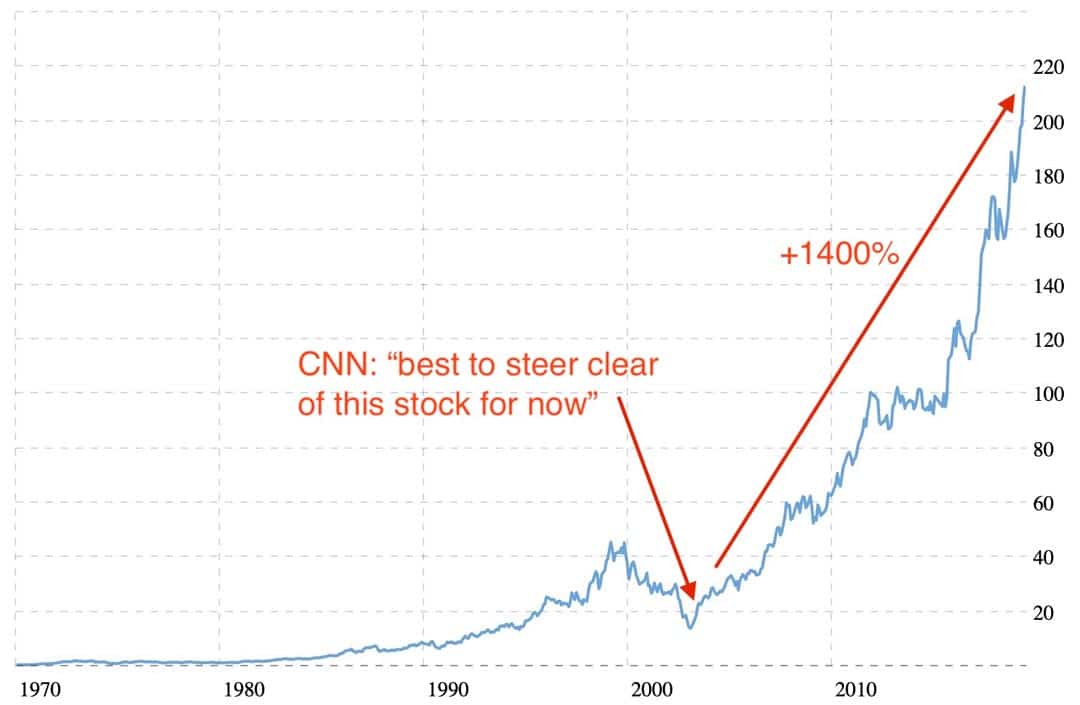Image by 8th.creator / Shutterstock.com
2003 wasn't a good year to be a shareholder of McDonald's.
The company had just posted its first ever quarterly loss since becoming publicly listed in 1965.
In just three short years, from late 1999 to early 2003, the stock had fallen by over 60%.
Worst of all, it seemed that the world was about to go off fast food for good:
- The New York Times claimed that McDonald's had become "uncultured, unclassy, and uncool".
- "Supersize Me", the documentary showing what happens if you eat at McDonald's every day, became a global sensation and raked in 100 times (!) its production costs at the box office.
- The Guardian wallowed in reporting that an obese teenager had sued the company, blaming the evil, capitalist corporation for his weight problems.
- Book stores carried bestselling titles such as "Fast Food Nation" by Eric Schlosser, and "Fat Land: How Americans became the fattest people in the world" by Greg Crister – neither one of which was particularly complimentary about the world's no. 1 fast food company.
- CNN described the overall situation the company found itself in as a kind of "climate change", i.e., a long-term, seismic shift.
Buying McDonald's shares at the time would have required not just the analytical skills to find value in the company's depressed stock. It would also have been necessary for you to go against the established belief at the time, one that assumed fast food to be a dying trend and McDonald's representing an amoral investment.
I remember this well because I was an occasional McDonald's customer at the time. I vividly remember sitting in the supremely well-located Karlsplatz branch in Munich, wondering what was to become of the chain that I had actually always been quite fond of?
In hindsight, the question is easy to answer. Simply put, the company proved everyone wrong. McDonald's shares have since soared by over 1,400%, making a small fortune for anyone who had the guts to go against conventional wisdom.
There are a few general lessons to be learned that are relevant today, which is why I am featuring McDonald's in today's Weekly Dispatch.

Easily fixable problems and a secret treasure chest
McDonald's had, indeed, committed a number of strategic and operational errors during the late 1990s. It fully deserved a severe setback in terms of earnings, reputation, and perceived future outlook.
Among its mistakes were:
- Putting too much emphasis on opening new stores at a rapid pace, and as a result, neglecting improvements in existing stores.
- Misjudging changing consumer preferences, e.g., only two out of ten menu innovations were actually in demand by its clientele.
- Ill-fated investments in technology that proved worthless.
- Appearing hapless, if not even arrogant, when faced with PR disasters like the "Supersize Me" movie.
When such a full-blown crisis occurs, the multi-million dollar question is always, is it a truly existential crisis and a permanently changed situation, or can it be fixed through better management? Would the alleged seismic shift indeed take place, or would it prove to be media hype that will eventually be replaced by the next media-manufactured doom-and-gloom scenario?
Trying to look at it objectively and without merely relying on the benefit of hindsight, this was a situation where investors should have jumped in at depressed prices and bet on an eventual turnaround of fortunes.
McDonald's still had a lot going for it at the time:
- It was one of the largest real estate owners of the USA (more about this shortly).
- Its brand was still among the world's best-known.
- Its financial loss, while painful, was far from life-threatening.
- It seemed unlikely that consumers' needs and desires for prime location, reliable and affordable places for meeting, eating, and drinking would ever go away.
Come to think of it, the then newly-appointed McDonald's CEO didn't have to engage in rocket science to right the ship. His strategy was based on common sense steps such as:
- Closing hundreds of underperforming restaurants.
- Halting new restaurant openings whilst focussing on getting more customers into the existing ones.
- Listening intensely to its franchisees, to learn what improvements to products and service were necessary. Something the company had neglected to do in the 1990s.
- Using "mystery shoppers" to visit branches and report back to the corporate headquarter.
- Countering negative PR and adapting to changing consumer trends by introducing a new range of salads.
It was much more likely that McDonald's was going to be able to reposition itself in the right way, than that the Golden Arches were to disappear altogether.
Possibly even more important was the fact that as a shareholder, you benefitted from a hugely valuable item on the company's balance sheet. Not that many people would have had this on their radar screen at the time.
McDonald's owned the majority of its restaurants, both the land and the buildings. At its low point, the company's real estate portfolio covered well over half of its remaining market capitalisation. Put another way, the entire McDonald's restaurant business – the brand, the network of franchisees, its know-how – was valued at a mere USD 4bn. The non-real estate "rump" was dirt cheap. There was no way anyone could build such a global brand and restaurant network without spending a multiple of this valuation.
Trading at a fraction of its "replacement value", this was a value investor's dream if ever there was one.
Finding similar opportunities for you
I did actually buy McDonald's shares at the time, though for some reason that I can't remember anymore I sold them way too early (probably because I needed the liquidity to chase another shiny object elsewhere – as one does in youthful enthusiasm).
Today, I look at such opportunities not just from the perspective of investors, but also with a clear eye to the management's challenge. Having turned around a few organisations myself, I now have an understanding of management challenges that back then I simply didn't have. Which is why I hope that over the next 10-20 years, my success in calling prospective turnarounds (and staying clear of companies that cannot be turned around) will be even more on target.
Another factor that I have picked up over the years is a much-improved ability to go against conventional wisdom. Come to think of it, I now even take actual delight in questioning conventional views with regards to their actual validity. It's fun to see how between then and now, not much has changed when it comes to the mainstream media being very pro-cyclical and behind the curve.
In June 2003, CNN's money programme reported about McDonald's: "Given the scope of McDonald's challenges and its murky future, it's best to steer clear of this stock for now."
They hadn't quite figured out that the new management had, indeed, brought a form of "climate change" to the company. Which makes for a great example of the value of much of the information you get from established, mainstream news outlets. They need to report what fits into peoples' existing believes, and their entire business model is geared towards being pro-cyclical.
For research that critically questions what the majority thinks and for investment ideas that you aren't likely to find in the mainstream media yet, I recommend you keep reading my regular missives instead. This is precisely what this website will continue to be about. At the very least, you'll get a few viewpoints that you won't easily find elsewhere. I am 100% convinced that if you want to succeed in multiplying your money over the next decade or so, going against the conventional wisdom is what will make you most likely to succeed.
P.S.: Come to think of it, my work quite regularly originates from a McDonald's branch. Not because I'd eat their food, which I hardly ever do these days. However, after their recent improvements to its coffee and with many McDonald's branches opening earlier in the day than cafes like Starbucks, I do still end up sitting there quite regularly. Nothing beats getting a head start for a productive day!
Did you find this article useful and enjoyable? If you want to read my next articles right when they come out, please sign up to my email list.
Share this post:
Get ahead of the crowd with my investment ideas!
Become a Member (just $49 a year!) and unlock:
- 10 extensive research reports per year
- Archive with all past research reports
- Updates on previous research reports
- 2 special publications per year
P.S.: Check out my latest in-depth report about an investment opportunity you won’t get to read about elsewhere (yet!). Available for Members only so sign up now to get immediate access.







